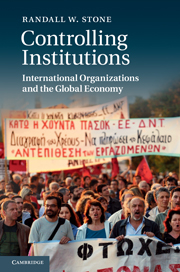Book contents
- Frontmatter
- Contents
- List of figures
- List of tables
- Preface
- List of abbreviations
- 1 Introduction: international organization and US power
- PART ONE THEORY
- PART TWO CASES
- PART THREE HYPOTHESES
- 7 Access to IMF resources
- 8 Conditionality under IMF programs
- 9 Enforcement
- 10 Conclusions
- Appendix: additional tables
- References
- Index
10 - Conclusions
Published online by Cambridge University Press: 11 April 2011
- Frontmatter
- Contents
- List of figures
- List of tables
- Preface
- List of abbreviations
- 1 Introduction: international organization and US power
- PART ONE THEORY
- PART TWO CASES
- PART THREE HYPOTHESES
- 7 Access to IMF resources
- 8 Conditionality under IMF programs
- 9 Enforcement
- 10 Conclusions
- Appendix: additional tables
- References
- Index
Summary
This book began by setting out a theory of equilibrium institutions, which was organized around the concept of informal governance. Formal and informal governance represent alternative social choice mechanisms – the former based on voting and formal rules, the latter based on power and informal influence – and these two mechanisms coexist in international organizations. The choice of procedures that incentivize or delegitimate the use of informal power is a critical step in institutional design, and in equilibrium the mixture of these modes of governance in international organizations balances the power and interests of strong and weak states. Chapter 1 situated this argument in political theory, and Chapter 2 formalized it as a game-theoretic model.
The second part of the book explored the implications of this theory in three international organizations chosen for case studies: the IMF, the WTO and the EU. The cases demonstrated two propositions. The first proposition is that, in spite of the variety of issue areas, the varying memberships and the differing contexts in which these organizations operate, informal governance mechanisms play important roles in each. Formal rules are also important in each organization, but in each case, the functioning of the organization cannot adequately be understood without taking into account the many ways in which informal governance mechanisms modify or overrule the formal procedures. Scholars who study the EU and the WTO have devoted considerable attention to this phenomenon, but they have generally failed to connect the dots, because they have not appreciated that informal governance mechanisms exist primarily to serve the interests of powerful states, while formal rules are generally designed to protect the weak.
- Type
- Chapter
- Information
- Controlling InstitutionsInternational Organizations and the Global Economy, pp. 207 - 224Publisher: Cambridge University PressPrint publication year: 2011



